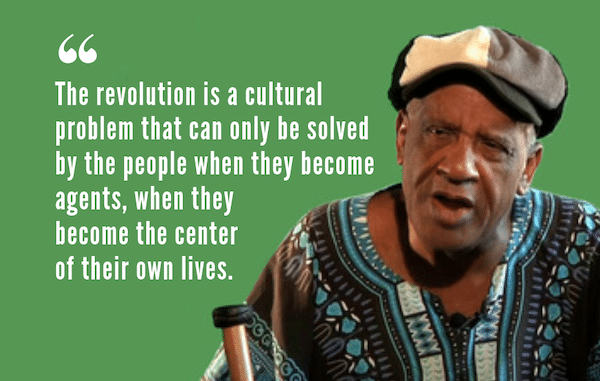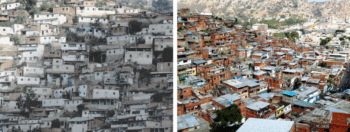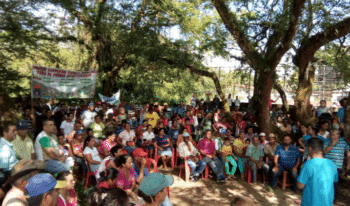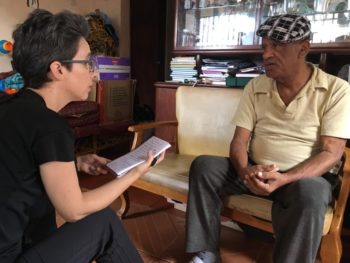Edgar Perez, better known as “Gordo Edgar,” participated in the most important events in recent Venezuelan history, from the Caracazo to the 4F insurrection to the anti‐coup mobilization that brought Chavez back to office in April 2002. A well-known personality in the popular movement, Edgar grew up in the 23 de Enero barrio in Caracas, but most of his activism took place in La Vega, a very poor barrio that, like 23 de Enero, takes pride in its history of rebellion and grassroots organization. Growing up in the ‘60s and ‘70s, Edgar calls La Vega, where we interviewed him, “a school for revolutionaries.” In this conversation, “Gordo Edgar” reflects on the vicissitudes of the popular movement while analyzing the role of Hugo Chavez in the Venezuelan revolution.
It would seem, in some mainstream narratives, that prior to Chavez emerging, there were no struggles. You yourself had a rich experience of activism, joining the urban resistance, working with insurgent movements, participating in counter‐hegemonic cultural production, and you were active during the insurrections of 1989 [Caracazo] and 1992 [4F insurrection]. What can you tell us about the popular movement before Chavez?
First, I should say that the popular movement, with its struggles, has periods of peaks–moments when society has come to the boiling point–and periods when it recedes somewhat.
Let’s take a look at our history. In the ‘60s and ‘70s, during the [guerrilla] insurgency, the popular movement in the city, in Caracas, and particularly in La Vega, was very active. Here, in La Vega, Bandera Roja [a revolutionary party at that time] developed a legal front, the CLP [Popular Struggle Committees], whereas the PRV [Party of the Venezuelan Revolution] had a mass front here as well, which was Ruptura. Finally, there was another organization which was the OR [Revolutionary Organization party] with the Socialist League as its legal front. By the ‘70s in La Vega, in addition to these organizations and a widespread environment of rebelliousness in the barrio, we had the grassroots Christian movement in its most radical and popular form, doing work in the community based on the premises of liberation theology.
One key figure here was Francisco Wuytack, a Belgian priest who arrived around 1965, was expelled from the country during the first Rafael Caldera government [1969-1974], and came back in clandestinely a few years later only to be expelled once again during Carlos Andres Perez presidency [1974-1979]. He truly shook our community because he brought in sectors that were lukewarm to the struggle, by linking their beliefs with the struggle.
So the ‘60s and ‘70s were impressive decades, decades of mobilization and action, when the barrio was boiling, and when the popular movement was the epicenter of daily life–a very rebellious popular movement!
Then the ‘80s came, and there was a falling off of popular organization. The ‘80s were not as effervescent as the ‘70s, but the general stupor was broken by the events of February 1989–what is known as the “Caracazo” but should really be called the “Guarenazo” to do justice to the people who sparked the popular insurrection, which began in Guarenas.
So the Caracazo breaks with a sleepy decade. Basically, the dam broke on February 27, just weeks after Carlos Andres Perez entered his second presidency [1989-1993]. The economic situation then was tremendously difficult. It was extreme.
Carlos Andres Perez had been elected by an ample majority of people who held the memory of the economic boom of the ‘70s. The basis of his victory was the prior bonanza. It was a false promise because his government implemented neoliberal adjustment policies just days after taking power. That, on top of the deteriorated economic situation, was the trigger for a popular uprising that began in Guarenas and shook Caracas.
During those days, people, humble people, took over the streets–we made them our own. We affirmed our existence in a process of expropriation of the expropriators. It was a totally spontaneous insurrection. There was no party or vanguard leading it… the vanguard was the people. It was us, the people from the barrios, doing justice, taking what should be ours. The old organizations, the parties associated with the left, they were immobilized by the rush of events.
We are talking about two or three days where the people were centerstage and corralled the political class and the rich. Those days were followed, of course, by a brutal repression that left us angry, having lost four to five thousand people, but it didn’t leave us numb, whereas it left the rich quaking in their boots.
Twenty years later, when we reflect on that rebellious outburst, we may ask ourselves about the conditions for insurrection today. The fact is that, for a variety of reasons and policies, both internal and foreign, our material conditions are worse than those in 1989… But the truth is that, with all the suffering and all the contradictions that we are facing today, we haven’t lost hope. We have a collective project which may be nebulous when it comes to the policies that are implemented from above, but we have a project that maintains our hope.
When we, the people, flooded the streets on February 27, 1998, and the days after, that was an expression of our rejection of neoliberal policies, but it was also a move to access the promised land, the land of goods and merchandise, an attempt to access what hegemonic society held as good and desirable. So first we went for the food–we were hungry–but then came the shoes, the refrigerators, the TVs. Today, under grueling circumstances imposed from within and from without, many of us hold on to a larger project.
Chavez, the memory of Chavez–and we should be wary and not turn him into a god–is what keeps the dam from breaking now… He is the only dead man who wins elections but, more importantly he is the only dead man who guarantees unity and hope, and reminds us that there is a path towards emancipation: the commune. Chavez was eliminated physically, but his ideas are ours now. Now, he is integrated into the people because he was one with the people: he was one of us.
What happened in the 1990s in the barrios of Caracas?
In the ‘90s, the Asambleas de Barrio [Barrio Assemblies] began to grow as spaces of organization at a territorial level. They were permeated by libertarian [in Spanish, libertarian refers to anarchist] ideals, and new connections among people began to emerge there.
In these Asambleas de Barrio, debates were driven from below. People talked about their problems among their peers, and we looked for collective solutions. It wasn’t the old parties, it was the people from the barrios who took centerstage, and the movement grew very rapidly, precisely because the restrictions imposed by the parties were broken by a new kind of practice that made each participant into an equal. This experience was very important in the early days of the revolution when the CTUs [local committees for allotting land titles to barrio dwellers] and the Mesas Técnicas de Agua [local committees organized for water access] emerged.
Around that time, we began to hear that in the military barracks an insurrectional movement was brewing. This wasn’t too much of a surprise since we had news of [revolutionary] work being done inside the barracks since the mid-‘70s and we had expected a popular military insurrection for a while.
Douglas Bravo [commander of the FALN, Venezuela’s guerrilla movement from the early ‘60s through the ‘70s] had talked about this possibility, Alfredo Maneiro [politician and theorist who participated in the insurgency in the 1960s] did so too, and Kleber Ramirez [a university professor who organized the PRV’s penetration into the military] had also predicted it. Kleber, in fact, was the founder of the Bolivarian movement that would eventually be led by Chavez. He and his people had infiltrated the barracks, which meant the movement wasn’t simply built by Chavez. Instead, Chavez worked with something that was already there.
So in 1992, at the peak of the Asambleas de Barrio movement, when once again the popular movement was heating up, then Chavez enters the stage. The truth is that when the insurrection happened some of us took part in it [as civilians], but much of the society had doubts since the 1989 [Caracazo] massacre was carried out by the military.
However, when Chavez and his people were defeated and he was given two minutes on television to surrender, what the people saw was a man like us, “a man of the people.” Obviously, his “por ahora” [“for now” refers to the two minutes on TV after the insurrection in which Chavez recognized his failure and but hinted that the struggle would continue] moved us. It shook us. There was a process of identification with the man, and his message became part of the popular discourse while Chavez was behind bars.
Two years later, when Chavez came out of prison, the terrain was ripe for constructing something new.
Look, as you know, I’m a libertarian anarchist, a Caribe [the rebellious indigenous group that settled much of the Venezuelan territory at the arrival of the Spanish colonists] libertarian, so I don’t believe that a man can single‐handedly reorient the course of history. However, it is true that Chavez was a catalyst for the coming together of multiple popular initiatives and proposals. His role was important for the popular movement’s rapid process of maturing.
A few years later, when Chavez opted for the electoral path and the possibility of “storming the fortress” of Miraflores [Presidential Palace], the popular movement cast its lot even more with him. In this regard, there is something that I would like to say here. I think it’s wrong to say that Chavez understood the people. Chavez did not simply understand the people and their project. Chavez was the people. Through him, the people saw themselves in a mirror.
Often, Chavez is seen as having created the revolution: Chavez as a messianic figure whose calling was to transform Venezuela. That reading, of course, erases the collective effort. In fact, between Chavez and the people there was a rich and fluid relationship. The people interpellated Chavez; they corrected him along the way and even rescued him after the 2002 coup! How do you understand the relationship between Chavez and the people?
I agree. The pueblo became the main actor–they were put in the leading role–when Chavez became president. But let’s go back a bit. Throughout the ‘90s the discourse of “the end of history” was widespread in politics, in the academy and in the media. That was also the time of the hegemony ofpensee unique.
Chavez emerged in that apparent desert–which, as I said, was boiling underneath–and stood up for Bolivarian thought. In so doing, he cast aside the end of history hypothesis, making history part of the present. So really what we find is Chavez as an actor but the people too becoming a visible political subject and political actor. Of course, there were contradictions. The people interpellated Chavez; the people corrected Chavez. All that is to be expected in a process where there was a common objective shared by the people and the man in Miraflores.
Let me give you an example. Chavez put the idea of the commune at the core of our project. The commune is a proposal that comes from the anarchist worldview–it is not top-down, it is a grassroots, from below proposal–and has a basis in our pre-colonial history as well. As the great comunicador, and from the privileged space of influence that he held, Chavez called on people to build the communes in an exercise of self‐emancipation. Then, the commune took on its own life in the popular imaginary… and real communal experiences began to emerge. In a contradictory way, however, Chavez also strengthened an institutional framework that was at odds with the commune. That was a contradiction.
In the USSR, in 1920, Kropotkin writes a famous letter to Lenin (a letter which, by the way, Chavez quoted in a public address). He tells Lenin that if the project isn’t in the hands of the people, in the hands of the councils or the soviets, the revolution will be lost. Chavez himself in his life understood the contradiction between the commune and constituted power, and he himself vacillated between one and the other… However, I would say that he ended up siding with the commune and with the people.
But look, while Chavez, a man of the people, embodied this contradiction, the people also fell prey to the hegemonic conception of power: interpreting power as residing in Miraflores.
Dogmatic Marxism‐Leninism also assumes that the key issue is controlling the presidential palace (or the state). In this regard, it should be made clear that the people haven’t taken control of the state apparatus… Perhaps that’s because they are not interested, perhaps because the people understand that power doesn’t reside in one building.
So the spirit of our collective project resides in the slogan “Commune or Nothing,” in an experiential process, a process of building from below. Here we can count on the laws of popular power which can sometimes help, but sometimes are a hindrance. Most importantly, however, we stand by the proposal [of the commune] that breaks with hegemonic power relations, both capitalist and statist.
We should understand another thing when we reflect on our revolution. Communal councils and communes cannot be imposed by decree, as we have witnessed on several occasions. Ours is a project of self-liberation. They cannot come to tell us what we should do, how we must organize ourselves.
As a project of self-liberation, we will also run into problems… because the revolution embodies a massive problem: a cultural problem first and foremost. It is not mainly an economic problem, as certain dogmatic theorists claim. Of course, current economic relations must be ended, but the revolution is a cultural problem that can only be solved by the people when they become agents, when they become the center of their own lives.
Clearly, the popular movement can experience ups and downs–as you have been pointing out with regard to Venezuelan history. What do you think has happened to the Left and the popular movement in this country right now?
Well, first we have to acknowledge one important fact. It’s that this a revolution took shape under the auspices of an economic boom. This is a revolution that was done with money! Remember that Venezuela is a country that is very rich in natural resources, and because the state is the owner and the manager of the oil wealth, that profoundly shapes politics here.
In Venezuela, a clientelist political practice developed early on. It had an important role in the governments of the populist Adeco party [Accion Democratica] prior to Hugo Chavez’s election in 1998.
The Bolivarian Revolution empowered people early on–there is no denying that–, but it simultaneously reinforced the old clientelist practices, which came to penetrate the popular movement. As a result, the popular movement became more dependent, less autonomous.
Really, the only revolution that has been done with money is this one, and that makes things very difficult! At the end of the day, everybody expects the state to provide the resources to do anything. That limits people’s creativity and weakens the popular movement from within. Dependence on the state was a hindrance to autonomous organization. We are paying the price for all that now!
There is another problem, and that is not particular to Venezuela. That problem is institutions. When I talk about institutions, I’m referring to parties, governmental offices, and ministries. Institutions operate under a logic that is cautious by nature and deaf to the people’s demands.
Basically, the predominant tendency in institutions hasn’t been a revolutionary one but a reformist one. Conversely, the people look to the institutions [for salvation]; they have become passive, waiting for institutions to direct the revolution. That creates a greater level of dependence that hinders people’s creativity and damages the organic character of the movement. This has happened here in Venezuela, and we have to stop it.
Most people in institutions are not committed to making the revolution more radical, which is necessary. Those people are committed to a mere reform, which is absurd in a country with our conditions. Reformist change actually is not possible here. They are only interested in maintaining their posts, they are wedded to the status quo. What is more, in the institutions there is a right‐wing–a Chavista right‐wing!–which is hegemonic. From those spaces of power, the left and popular tendencies are interpreted as problematic.
The [institutional problem] has much to do with the colonization that is still alive here. I’m one of those people who shares with Enrique Dussel the idea that decolonization is important. What the left has done once and again is to repeat models that have nothing to do with us.
The commune is, however, something different. The commune is our project, it is not a “colonized” proposal, since it comes out of historical experiments such as the Paris Commune and, more importantly, has deep roots in the communal forms of organization that existed here prior to the arrival of the Spanish. We can also draw links with the black cumbes [maroon settlements in Venezuela]. We are always looking to the outside, beyond our frontiers.
Would you say that a process of decolonization is important if we want to come out of the current crisis?
Yes, that is the key. We have to recognize ourselves. We must stop looking at ourselves in the mirror of the West…Galeano talks about this, about the discovery that wasn’t and the discovery that is still pending. Our memories have been erased. That is so much the case that people don’t know anything about the history of the cimarrones [runaway slaves] or of indigenous people and what they brought to our culture. When we finally learn about our culture and learn about our roots, that will bring about something new.
We have been in an induced amnesia for the past 500 years, and it turns out that the occidental form of politics still organizes our political sphere. Simon Rodriguez [Venezuelan philosopher and Simon Bolivar’s teacher] said that we must create a new utopia on this continent, new institutions; he said that we shouldn’t let ourselves age prematurely by adopting the institutions of the old continent. Europe is very worn out, the U.S. is what it is. We have to create our own institutions.
Simon Rodriguez also talks about toparquia [power organized at a local level]. He meant power operating on the territorial level, which goes hand in hand with self‐government.
The government is penetrated by a top‐down vision and in it the Right, as I said, is quite present. Still, we will defend that government whenever faced by an imperialist aggression. However, beyond this kind of defense, our main focus should be to find forms of organization that are ours. We have to overcome 500 years of colonialism. That isn’t easy, but it is our most urgent task now.




